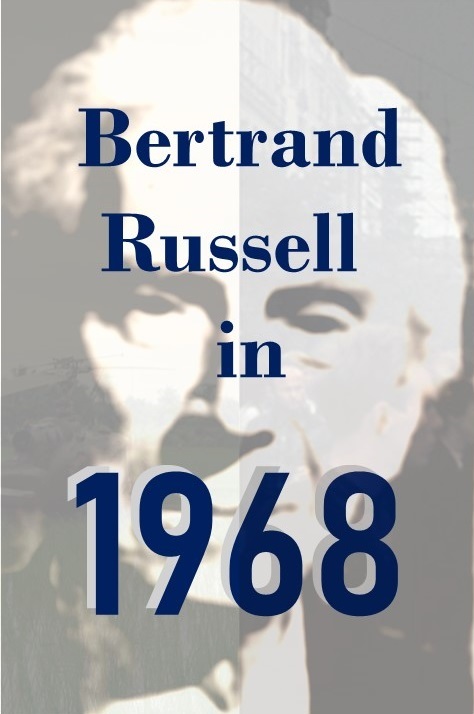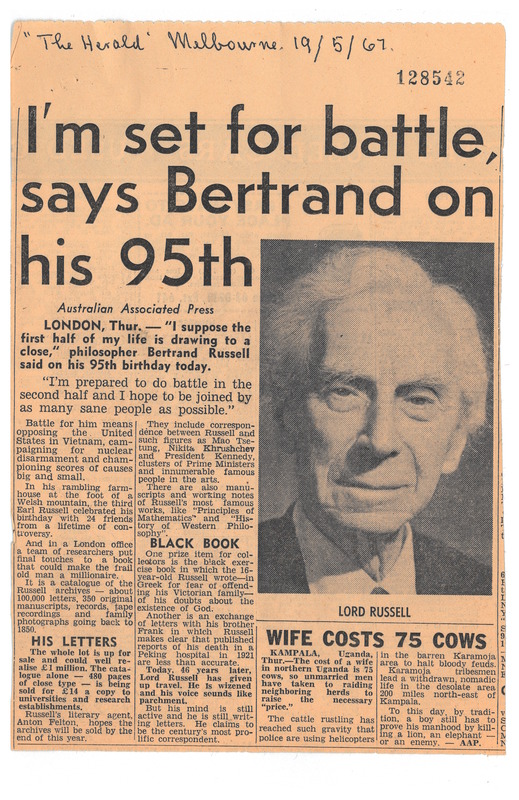A near decade of simmering tension, conflict, and social upheaval erupted in one of the most eventful years of the 20th century. Not since 1848 has one single year seen such a flurry of political activity across the globe. The United States of America, Vietnam, France, Britain, Czechoslovakia, Nigeria, Poland, Mexico, and other countries each experienced 1968 uniquely and interconnectedly, with long-lasting repercussions for that political moment that continues to affect our world today.
For McMaster University, 1968 would also witness a seismic event: the acquisition of the papers of Lord Russell, one of the century’s most respected and impactful thinkers. The arrival of the Russell Archives McMaster would forever tie his legacy with ours and establish the university as a centre for the study of Russell’s life and work.
For Bertrand Russell himself, 1968 would also be an eventful year. In the year in which he turned 96 years old, Russell showed no signs of slowing down in his life-long pursuits of peace, knowledge, and justice. In his life’s final act, he solidified his legacy as a proponent of peace, commenting on and trying to influence the events of modern history’s most tumultuous year--in his correspondence, press statements, and interviews. These documents showcase the advocacy and actions of Russell as a public intellectual, as he discussed the complex issues of the day often with force and always with clarity.
This exhibit compiles notable letters, press statements, and public announcements by Bertrand Russell in which he comments on the events of 1968. The archival items selected here offer us a keyhole view into Russell’s political legacy. This exhibit also showcases some of the most important, and lesser-known events of 1968 -- a year of upheaval and transformation.
In May 1967, at age 95, Russell set out his goals for the coming years. Joking to his interviewer that he still had ‘the second half’ of his life ahead of him, Russell reiterated his commitment to the struggles of his era. These were relayed in the article as “opposing the United States in Vietnam, campaigning for nuclear disarmament, and championing scores of causes big and small.”
The article goes on to say that Russell was pursuing buyers for his archival papers, which could make him a “millionaire.” Amongst the prized items singled out from the archives, which were not yet fully catalogued, were his correspondence with Mao Zedong, Nikita Khrushchev, and John F. Kennedy, his book manuscripts, and his childhood exercise book in which his atheism was first expressed on paper. Although the article suggests that the archive would be worth a considerable sum and would make Russell a wealthy man, it fails to inform the reader that he planned for the profits of the sale to go directly to the Bertrand Russell Peace Foundation. “[T]he archives will not put an extra penny into my pocket” he would later write (7317).
This interview serves as an introduction to the events of 1968, in which the war in Vietnam, the peace and civil rights movements, and the struggle against tyrannical political regimes would take centre stage.
Curation and text by Christopher Long, Archives Arrangement and Description Librarian, William Ready Division of Archives and Research Collections, McMaster University. © 2024
Special thanks to Rick Stapleton and Andrew Bone, Ph.D., for their assistance with this exhibit.

